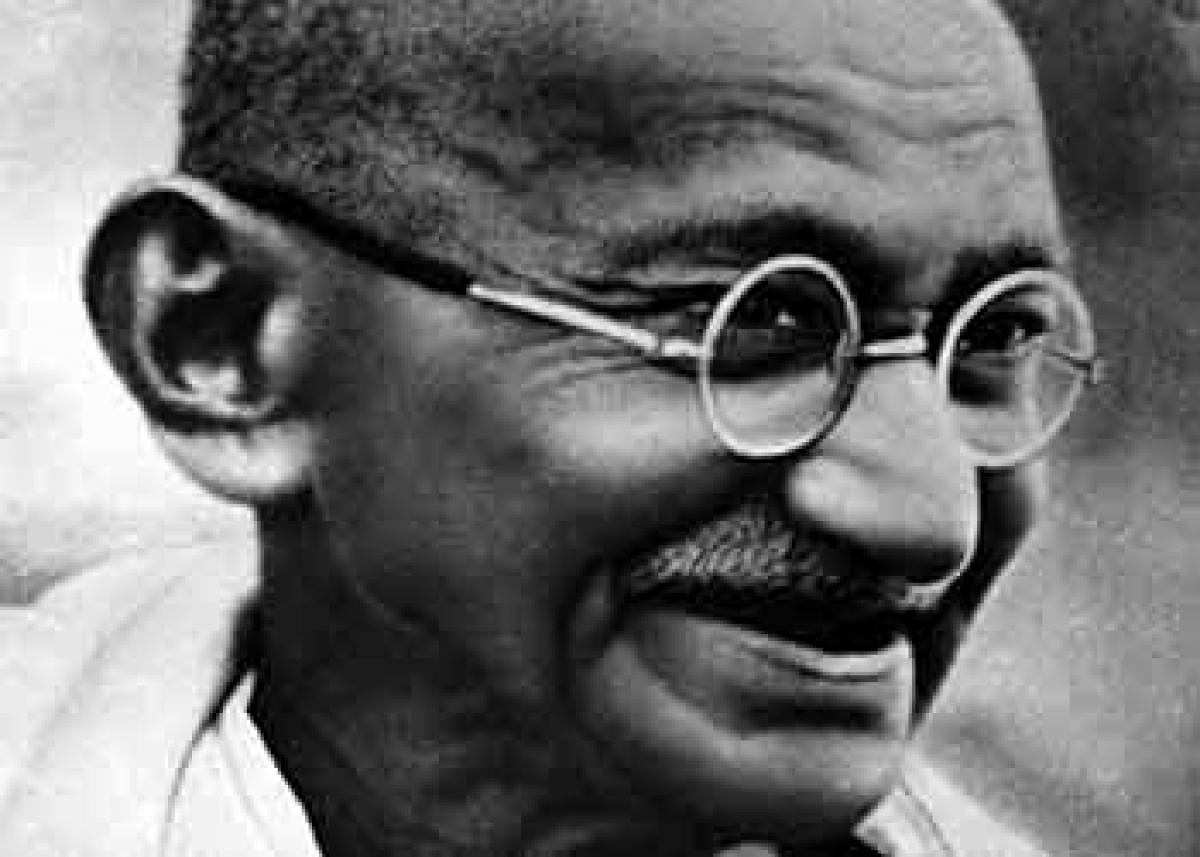Live
- Bengal: ED investigating bank accounts of Bangladeshi citizens arrested in Hawala scam
- National Racing C'ship: Tijil Rao dominates in Formula LGB4 title race
- Hyderabad Comic Con: A Thrilling Celebration of Comics, Gaming, and Pop Culture
- Football: Trio leave Spain squad, Barrios gets call-up for Nations League clash with Swiss
- Dragon boat races during water festival in Cambodia ends with award ceremony
- Manipur bodies recovery: Widespread mob violence reported, curfew imposed, mobile internet suspended
- WPGT 2024: Hitaashee doubles lead to six shots in 14th Leg; Nayanika Sanga, Vidhatri Urs in pursuit
- Despite ideological differences, Cong has highest respect for Balasaheb Thackeray: Priyanka Gandhi
- Waqf row: BJP to stage protests before DC offices across Karnataka
- Disinformation major challenge, says Pak army chief after drawing flak on social media
Just In

Sixty seven years after Gandhiji’s death, Bapu is fondly remembered for his pearls of wisdom. Among many things, his efforts at religious and communal harmony have fascinated many.
 Sixty seven years after Gandhiji’s death, Bapu is fondly remembered for his pearls of wisdom. Among many things, his efforts at religious and communal harmony have fascinated many.
Sixty seven years after Gandhiji’s death, Bapu is fondly remembered for his pearls of wisdom. Among many things, his efforts at religious and communal harmony have fascinated many.
“Many times Mahatma Gandhi appreciated, admired, and acclaimed Jesus Christ, Prophet Muhammad and Buddha. Yet he did not change his religion. Why?” This is a question to which many have tried to find the answer, yet in vain.
Spurred by these thoughts, Dr Gautham Kashyap directed a film titled ‘An Encounter with Mahatma’, which is a docufiction work of 12 minutes that will be released across the globe on October 2 to commemorate Mahatma Gandhi’s 146th birth anniversary.
The film is said to be the first of its kind, recreated to portray Gandhiji’s religious views. It is based on the book “My Religion, MK Gandhi”, compiled and edited by Bharatan Kumarappa.
Dr Gautham Kashyap has an MA in Telugu Literature and a PhD from Presidency College, Chennai. ‘An Encounter with Mahatma’ was produced by BVS Srinivasu (Veera Sanker),
president of the Telugu Film Directors Association; and Anuradha Umarji, screen writer. Excerpts from an interview with Dr Gautham Kashyap:
The film explains Gandhiji’s views of religion; can you add a little more to it?
When my son asked me questions about God and why people believe in different Gods, it made me wonder. I believe that today we need Mahatma Gandhi more than ever, especially to answer the fundamental doubts that the present youth ask.
What Gandhiji has always tried to convey is that God is only one, although we may address him by different names. God speaks in the language that we understand,
which is why he appeared in various forms as different influential people in the past – and he will continue to appear in future, too. Our parents care for us and wish to do everything they can to help. Similarly, even if you do not believe in God, he cares as a parent does.
Why is the duration of the film only 12 minutes?
There are long writings on Gandhiji’s religious views but we need to keep things crisp for the screen so that it is easy to watch and understand a heavy topic such as this.
What was the challenge in acting as him… virtually filling Gandhi ji’s shoes?
Yes, there was a bit of pressure. I had to be careful that the words I used were sensitive and reflected Gandhiji’s own sentiments. I tried to do my best because, if I do injustice to Gandhi, every Indian will become a Godse.
In fact, the spectacles I wore in the film were the same power as Gandhiji’s original glasses. That’s one of the ways in which I tried to recreate the character as closely as possible.
Tell me a little about your research and the difficulties you faced along the way.
I started my research in 2002. I visited Ashrams, spoke to people, and bought books to read on the topic. That’s how I came across “My Religion, MK Gandhi” by Bharatan Kumarappa.
I travelled to Sabarmati Ashram so that I could understand Gandhiji better. At first I was denied access for the purpose of the film. However, over many interactions with Amruth Modi, the director of Sabarmati, I was allowed to shoot there and am very thankful for the same.
During my research, I met Sudhakar Chaturvediji at Bengaluru. As Mahatma Gandhi’s contemporary he was able to share some interesting insights with me. Later when he saw the final product of my film, he appreciated my acting, saying that it was so close to Gandhiji’s real self.
Will we see more of Gandhiji from you in the future?
Yes. Up next are more films about Gandhiji. Portraying the person that he was, and how he is still relevant to our present day society.
I hope that the upcoming films will be an interaction between Gandhi and society, on how to speak and live harmoniously with people who are different from us. ‘An Encounter with Mahatma’ is but a trailer for the big screen.
By:Elita Enoch

© 2024 Hyderabad Media House Limited/The Hans India. All rights reserved. Powered by hocalwire.com







